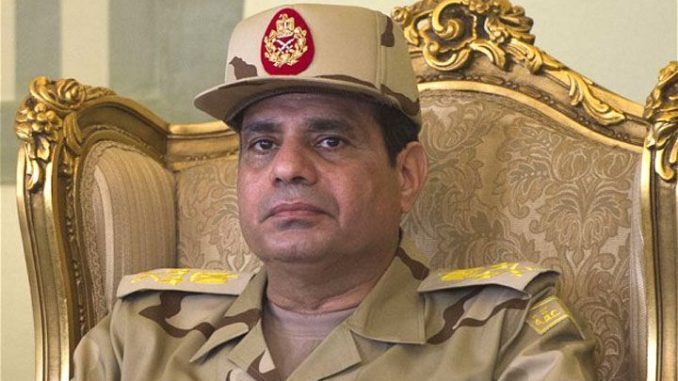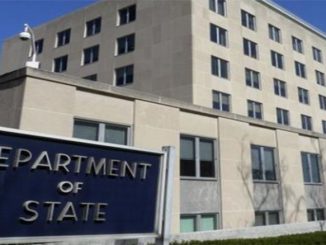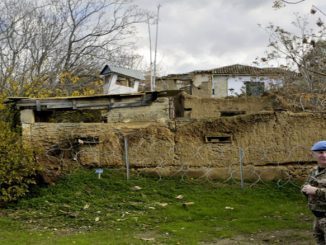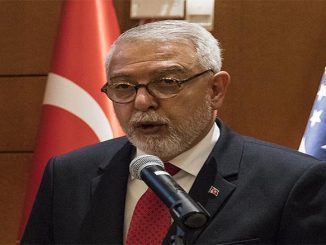
Internal Egyptian government documents show officials in Cairo scrambling to do damage control after U.S. spy agencies uncovered an alleged scheme to smuggle North Korean military cargo into the country in defiance of international sanctions, says the Washington Post in a report.
The newly obtained records include what appears to be an explicit acknowledgment of the Egyptian military’s role in purchasing 30,000 rocket-propelled grenades that were discovered hidden on a North Korean cargo ship in 2016. The vessel was headed to an Egyptian port in the Suez Canal at the time of the bust, which a report by the United Nations described as “the largest seizure of ammunition in the history of sanctions” against the communist state.
North Korean officials continued to demand payment for the estimated $23 million weapons shipment, prompting fears among the Egyptians that they might be subjected to blackmail, according to the Foreign Ministry documents obtained by The Washington Post.
An Egyptian government spokesman declined to comment on the documents. The Post first reported on Egypt’s clandestine deal to purchase the North Korean grenades in October 2017.
The North Korean-owned freighter Jie Shun was halted after U.S. intelligence agencies alerted Cairo to the possible presence of hidden contraband aboard the ship. Egyptian authorities uncovered the grenades and impounded the vessel. Only then did U.S. officials discover that the intended recipients were the Egyptians themselves.
Egyptian officials never publicly acknowledged purchasing North Korean military equipment, a practice that is banned under U.S. and U.N. sanctions. Trump administration officials in 2017 ordered a freeze on the delivery of $300 million in military aid for Egypt, in part because of unspecified secret arms deals between Cairo and Pyongyang.
But strained ties with Washington were only part of the fallout over the arms deal. The new documents appear to show deep concern among Egyptian officials over a host of problems stemming from the discovery of the arms shipment, including the possibility that North Korea would threaten to expose details of the business relationship.
The Egyptian Foreign Ministry documents are dated from March to May 2017, before Cairo’s role in the arms transfer was publicly known. One of them, a memo from May 28, 2017, prepared for Egyptian Foreign Minister Sameh Shoukry, discusses North Korea’s unhappiness over the seizure of the grenades and offers suggestions on how to keep the affair quiet. It refers to a letter sent by North Korea to the Arab Organization for Industrialization — the state-owned Egyptian defense industry conglomeration — demanding payment and issuing vague threats.
“The letter once again included threats made by the North Korean side to disclose what they know about details of this shipment,” the memo states. The document says the Egyptian company “denies knowing about” the arms deal, but a few sentences later it urges a quick financial settlement to keep the North Koreans quiet.
“We have made clear that the Ministry of Foreign Affairs favors to speed up the processing of this settlement at the earliest time,” and preferably before Egypt’s rotating membership in the U.N. Security Council ended in December of that year, the memo states. The first public disclosures of the weapons seizure occurred in a report by the U.N. Panel of Experts, a watchdog organization created by the council to investigate violations of U.N. sanctions against North Korea.
The memo of May 28, 2017, outlines a strategy for resolving the payment dispute. Under the plan, Egypt’s military intelligence agency would handle the negotiations, working through North Korea’s military attache in Cairo. The memo mentions a recent Egyptian loan to North Korea — the details are not spelled out in the documents — and suggests that Pyongyang might agree to a smaller payment for the grenades in return for more generous terms for repaying the loan.
“Using this ‘loan card’ has [already] succeeded in pushing the Korean side to communicate with the Egyptian side,” it says.
How the matter was ultimately resolved — including how much money, if any, was paid — is not clear from the documents.
The 2016 incident shed light on a little-understood global trade in conventional arms that has helped North Korea survive economically despite severe sanctions imposed by the United Nations and the United States in response to that country’s tests of nuclear weapons and nuclear-capable ballistic missiles.
Restricted from selling coal and other commodities, North Korea has resorted to selling military equipment and weapons. at cut-rate prices. Its customers have included fellow pariah states such as Syria, as well as sub-Saharan African countries such as Uganda and Congo, which for decades relied on North Korea to train and equip their armies. North Korea has also supplied arms to nonstate actors such as the militant group Hezbollah, according to U.N. reports and documents.
Because such sales are outlawed, North Korea often goes to great lengths to conceal the transactions. The grenades shipped to Egypt in 2016 were carried on a ship that sailed under a Cambodian flag, even though the vessel and cargo were North Korean-owned. The Jie Shun’s manifest listed its only cargo as limonite, a kind of iron ore. Customs officials who searched the ship in 2016 first saw only piles of yellow limonite stones in the ship’s cargo hold. But hidden beneath the stones were scores of wooden crates filled with grenades.
A statement provided to The Post in 2017 by the Egyptian Embassy in Washington did not directly address the alleged sanctions violations, but cited Cairo’s cooperation with U.N. officials in finding and destroying the contraband.
“Egypt will continue to abide by all Security Council resolutions and will always be in conformity with these resolutions as they restrain military purchases from North Korea,” the statement said.
*The report was published by The Washington Post’s Joby Warrick and Sudarsan Raghavan on 26 Oct. 2019.



